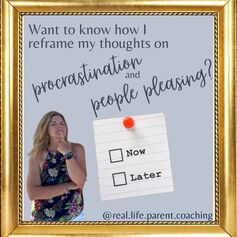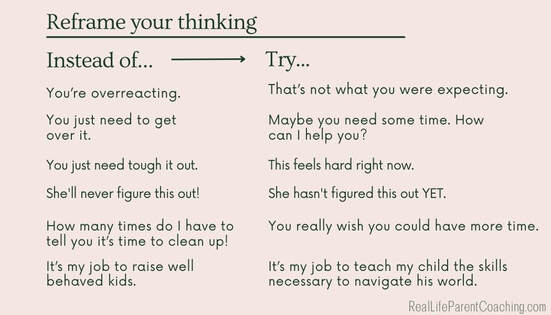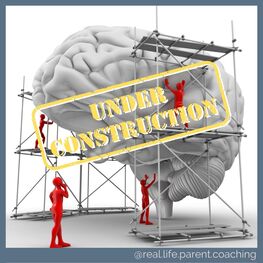Reframe Your Traits to Work for YOU! I have a ‘people pleaser’ personality and the last person I tend to please is myself. Which, for obvious reasons, rarely works out in my favor. I’m also a procrastinator, so let’s just add that fuel to this already smoking fire. ;) I’ve done a lot of work creating personal boundaries and expectations, and follow the motto, “Be kind to yourself.” But I’m going to share a trick - a reframe - that has been so helpful in ‘allowing’ me to put myself first. I think of myself as three separate people, Past Rebecca, Present Rebecca and Future Rebecca. I know, it sounds a little whackadoo. But, stick with me here. People pleasers and procrastinators, I’m talking to you! Whenever I’m faced with a task I can do now or put off, I think about ‘Future Rebecca.’ I think about how busy she can get and how she could really use a break. It would feel good for Present-me to take something off Future Rebecca’s plate and make her day a little easier! It’s totally a win-win. Present-day me feels good about helping someone else, and Future me is psyched the work is handled! I even verbally thank ‘Past Rebecca’ for helping a sista out! Reframing my thoughts on procrastination has allowed me to be a ‘people pleaser’ for myself! Hello, self care! My kids also like to put off tomorrow what they could do today, so I’ve been pumping this message their way. It has been inspiring my kids to help out their best friend - their future selves! Do you have any traits that hold you back from reaching your full potential? How could you reframe those traits in a positive way so they would serve you well?
0 Comments
Processing Big Feelings! Imagine you’re meeting with a close friend for a coffee date. While sipping your coffee you begin to discuss an event that is heavy on your heart. An experience that really stirs up emotions as you are still trying to make sense of it all. You begin discussing this sensitive topic with your friend and she says, “Oh, sweetie! We’ve already gone over all this. Why don’t we talk about something happier!!” as she takes a sip of her coffee. Or perhaps as you are rehashing your experience, your friend tries to give you all the possible solutions with, “This is what you need to do...you should….” How would that feel for you?? I’m assuming you’d feel dismissed, misunderstood, not truly seen and perhaps even embarrassed. I’d also venture to guess you’d be reluctant to share your true feelings and emotions with this friend moving forward. It may be tough to picture yourself saying these things to a friend because it lacks care and concern. But have you ever found yourself saying these things to your child as they were retelling a story? Especially when they were resharing an experience for the umteenth time? Or maybe you have ‘yes-ed’ and ‘uh-huh-ed’ them as they retold what happened? I know I certainly have! Many times a child's perception and worry may seem irrational to adults, but these struggles and emotions are very real for the child. When we don’t allow our kids the space to express what they’re feeling (over and over again!), it sends a message that could leave them feeling unseen, misunderstood, and embarrassed. Similar to our feelings towards the friend at the coffee shop, children may also choose to withhold from sharing in the future. They may even act out to win your attention or have a meltdown from remembering the emotions of the event. Reflecting on the coffee shop scenario — Many of us may appreciate a friend who would carefully listen while we vented. A friend that may offer up a hug. Perhaps a friend who would say, “Those are heavy feelings you’re dealing with. I’m really feeling for you because I know you’re going through a lot right now. What can I do to support you?” These simple sentences offer you the space to feel validated and understood.  Why Is This Important? When we are dealing with big emotions, our brains work diligently to try and make sense of it all. Our right-side emotional brain is heavily engaged, replaying the scenes, feelings and sensations over and over again until the left-side rational brain can process and digest the information in a sensible way. The problem is, a child’s brain is not fully developed until they are in their early twenties. Children do not have the capacity, life experience or coping strategies of an adult to sort through big feelings systematically. Fortunately, there are ways for parents and caregivers to help children fully integrate these big feelings and experiences. In the book The Whole-Brain Child, authors Dan Siegel, M.D. and Tina Payne Bryson, Ph.D., state, “In order to live balanced, meaningful and creative lives full of connected relationships, it’s crucial that our two hemispheres work together.” They go on to say, “We want them to become horizontally integrated, so that the two sides of their brain can act in harmony. That way, our children will value both their logic and their emotions; they will be well balanced and able to understand themselves and the world at large.” So, how do we achieve integration of the left and right-side brain? How do we help our children feel understood and supported while helping them make sense of their feelings? How do parents and caregivers find the energy to stay calm and focused if (and when) your child becomes emotional while working out these big feelings? Here are some tips-
Research suggests when parents put their child’s experiences into words, it activates brain calming neural pathways. I know it can feel like a challenge to remain patient while guiding your child through this process. But I can say with confidence that the time you spend integrating their emotions will be quicker (and more productive!) than the overreaction you may encounter due to dysregulation. And most importantly, this process will strengthen the bond with your child, establish trust and increase their likelihood to share feelings with you as they grow older. Now there’s a win! What is your typical go-to response when your child needs to rehash an event? How would it feel for you to test drive one of these tips? |
AuthorRebecca Murphy, Certified PCI® Parent Coach. CategoriesCategoriesArchives
October 2023
|
'Creating solutions for your Real Life family situations.'
©2019, Real Life Parent Coaching, LLC
Proudly powered by Weebly

 RSS Feed
RSS Feed


